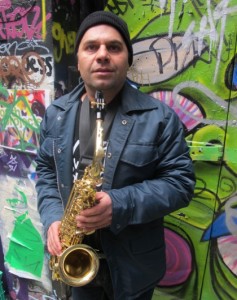A musician’s battle to be heard
 Playing the music he loves put Iranian saxophonist Hadi Mohammadi in an invidious position.
Playing the music he loves put Iranian saxophonist Hadi Mohammadi in an invidious position.
Either give up his dream of carving a career and a life out of music or risk ending up in jail – or worse.
The crackdown on secular music by the authorities in his homeland – and the fact that he had been arrested and locked up several times – left Hadi no choice but to gather his family and flee.
Hadi and his wife and child caught a plane to Indonesia and found a people smuggler to take them to Australia by boat.
“I could not stay in Iran after the government cracked down on musicians. The only places we could play were in underground venues – sometimes literally in cellars,” Hadi said.
“I am a musician – it is all I know how to do. Once I had been arrested a couple of times I was a marked man for the government. I knew they might come for me at any time,” he said.
“If I wanted to live – if I wanted a life, I had to leave,” said Hadi, who studied the saxophone in the UK.
He said the boat journey was a 13-day ordeal with rough weather and sickness among the passengers.
“It was very bad and I was afraid for my family but I didn’t have any choice if I wanted to have a safe life and live my dream to play music,” Hadi said.
Since the establishment of the Islamic Republic of Iran, music has been the subject of fierce political and religious debate in Iran. Its legal and social status has constantly been changing and continues to be the object of various restrictions because of music’s purported power to seduce and corrupt.
From early on, the official position of the Islamic regime was unmistakable. All concerts, and especially all radio and television broadcasts of foreign and Iranian, classical and popular music, were banned.
The only genres of music acceptable in the Iranian republic are Iranian folk music; Iranian classical or “traditional” music and a heavily censored form of pop music that is almost universally unpopular with young people.
Under these strict rules however, an underground music culture has flourished. The very intention of abolishing music in public life has unexpectedly led to the practice of music groups forming within family circles or among people of the younger generation of all social classes.
In January, five Tehran musicians were arrested and jailed on charges of collaborating with LA-based musicians and satellite channels. The police raid was apparently prompted by the recording and distribution of a song with political content that the regime found objectionable.
“In Iran there are rules about everything. If you want to play or record music, you have to get permission but there is a lot of corruption so it’s not that easy,” Hadi said.
“Even if you think you have got permission, the government can come along and stop you and lock you up and even accuse you of terrible things like being a traitor, being an infidel,” he said.
Since arriving in Australia, Hadi has been playing with a number of bands. As an asylum seeker on a bridging visa, he does not have work rights, but plays as a volunteer.
He is involved with groups playing classical music, swing, big band and blues – music he could never hope to perform publicly in Iran.
“In Australia there is freedom to play whatever music you like. I am playing with three very good groups and I feel very good about this,” Hadi said.
“Here people appreciate many kinds of music and I hope I can work as a musician one day,” he said.












